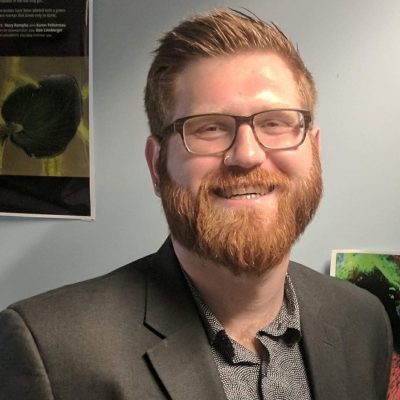Student Spotlight: John McMullen

June 29, 2020
John McMullen is a doctoral candidate in entomology from Phoenix, Arizona. After earning a bachelor’s degree at the University of Arizona, he chose to pursue further study at Cornell for the ability to work with experts in chemical ecology and microbiome science as well as the graduate student community.
What is your area of research and why is it important?
I use the common fruit fly (Drosophila melanogaster) and their gut microbiome as a model for studying the microbial contributions to obesity and metabolic syndromes in humans. I am interested in how gut microbes interact with one another and their animal host, in particular the chemistry that mediates these processes as well as the variation of responses in different animal sexes to the presence of their gut microbiome.
What are the larger implications of this research?
The human gut is a species-rich environment, colonized with thousands of microorganisms. However, this complexity brings many challenges when investigating which microbes are actually important for human health and can be harnessed for microbial therapies (like probiotics). To overcome this hurdle, I use the Drosophila gut microbiome as a biomedical model for obesity and metabolic syndromes in humans as many gut microbiome interactions and metabolism are conserved among animals. The microbial community in fruit flies can be simplified to several different species, which allows for experimental approaches to investigate how gut microbiome members interact with one another and the gut.
What inspired you to choose this field of study?
I was never one to like bugs or soil (or just anything that could be deemed as gross) as a child. However, upon arriving to college I became an enthusiast of insects and the microbes that colonize them. The relationships between insects and microbes are widespread and diverse, and I found it amazing that I could investigate these relationships for microbial therapies in biomedical and agricultural issues.
What does it mean to you to be a Bouchet scholar?
As a queer identifying individual and first-generation college student, continuing in academia for me means creating more inclusive spaces for all backgrounds and identities, which are spaces that I have not always had during my academic career thus far. I applied to the Bouchet Scholar society to broaden my network of academics that are also invested in diversity initiatives and creating these inclusive and equitable spaces.
How do you exemplify the five pillars of the Bouchet Society – character, leadership, advocacy, scholarship, and service?
I am a queer, first-generation college student advocating for diversity and equity within academic spaces, which has included serving in multiple leadership roles in oSTEM, Graduate Women in Science, and Cornell Diversity Preview Weekend – most recently I served as the Global Vice President of Finance for oSTEM. On campus, I have organized several events to increase awareness surrounding implicit biases and have brought diverse faculty to increase awareness and access to issues of LGBTQ+ and first-generation college students in academia.
What are your hobbies or interests outside of your research or scholarship?
I am an avid crocheter, frequent runner, and proud cat parent. My partner and I have way too many houseplants – I am working to expand our home collection of spiderwort plants. I have recently started making sourdough bread with my homemade sourdough starter.
Why did you choose Cornell to pursue your degree?
My reasoning for choosing Cornell was two-fold. First, I was excited at the prospect to work with experts in chemical ecology and microbiome science. Secondly, the graduate student community seemed to be strong, happy, and supportive of one another.
